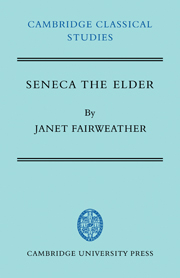Book contents
- Frontmatter
- Contents
- Preface
- Abbreviations
- PART I THE PLACE OF SENECA THE ELDER IN LITERARY HISTORY
- PART II SENECA THE ELDER ON THE HISTORY OF ELOQUENCE
- PART III FIVE ASPECTS OF DECLAMATION: THE ELDER SENECA'S EVIDENCE
- 1 Inventio
- 2 Dispositio
- 3 Elocutio
- 4 Memoria
- 5 Actio
- PART IV THE PLACE OF EARLY IMPERIAL DECLAMATION IN LITERARY HISTORY: THE ELDER SENECA'S EVIDENCE
- Indexes
- Frontmatter
- Contents
- Preface
- Abbreviations
- PART I THE PLACE OF SENECA THE ELDER IN LITERARY HISTORY
- PART II SENECA THE ELDER ON THE HISTORY OF ELOQUENCE
- PART III FIVE ASPECTS OF DECLAMATION: THE ELDER SENECA'S EVIDENCE
- 1 Inventio
- 2 Dispositio
- 3 Elocutio
- 4 Memoria
- 5 Actio
- PART IV THE PLACE OF EARLY IMPERIAL DECLAMATION IN LITERARY HISTORY: THE ELDER SENECA'S EVIDENCE
- Indexes
Summary
According to Quintilian (III.3.4), Albucius had advanced the heretical view that the art of oratory consisted of only three, not five, parts: memoria and actio were to be excluded as being natural gifts. Quintilian disagreed with Albucius, though he had to concede that the opinion that actio was the product of natural endowments was nothing new, but even had the support of the sophist Thrasymachus. Seneca the Elder says nothing about this theory of Albucius, but his own position with regard to one side of the issue is clear enough. He was convinced that memory could be assisted by art: Latro's memory, for example, was natura guidem felix, plurimum tamen arte adiuta (Contr. I pr. 17).
As we have seen, Seneca claims in Contr. I pr. 2 to have been the proud possessor in youth of a memory which verged on the miraculous: he had been capable of remembering two thousand random names and reproducing them in the correct sequence, and of memorizing more than two hundred assorted lines of poetry and then reeling them back to his amazed school-fellows in reverse order. About Latro's memory too he makes claims calculated to astound his readers:
in illo non tantum naturalis memoriae felicitas erat, sed ars summa et ad conprehendenda quae tenere debebat et ad custodienda, adeo ut omnes declamationes suas, quascumque dixerat, teneret etiam. itaque supervacuos sibi fecerat codices; aiebat se in animo scribere. cogitata dicebat ita ut in nullo umquam verbo eum memoria deceperit. historiarum omnium summa notitia: iubebat aliquem nominari ducem et statim eius acta cursu reddebat; adeo, quaecumque semel in animum eius descenderant, in promptu erant.
(Contr. I pr. 18)- Type
- Chapter
- Information
- Seneca the Elder , pp. 228 - 234Publisher: Cambridge University PressPrint publication year: 1981

